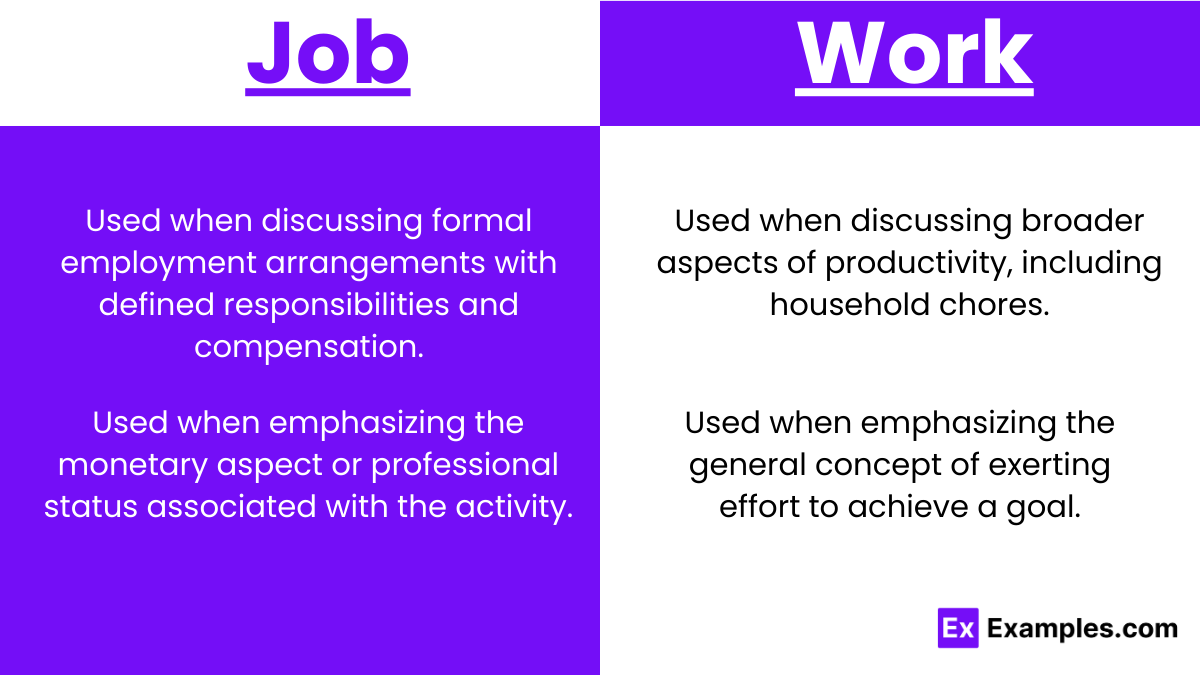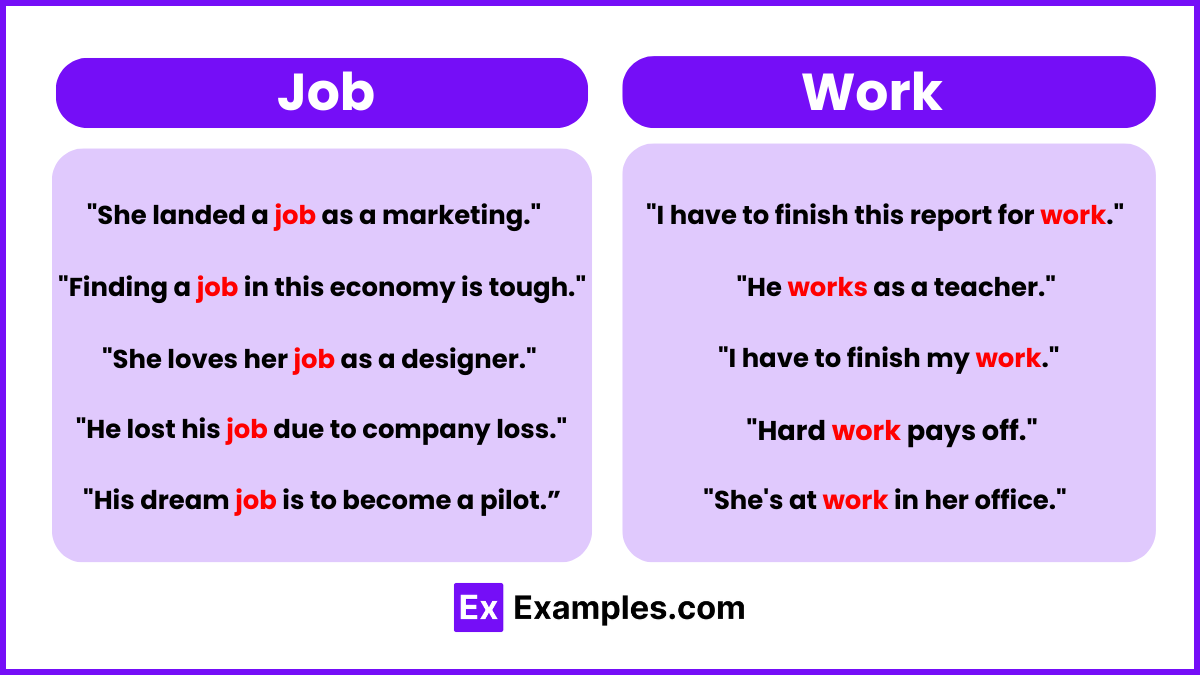Job vs Work- Meanings, Examples, Differences, Usage
“Job” and “work” have distinct meanings: while a “job” typically refers to a specific activity for earning a living, synonymous with “profession” or “occupation,” “work” encompasses any activity, whether mental or physical. While all jobs can be considered work, not all work is a job. Moreover, “work” can function as both a noun and a verb, whereas “job” solely serves as a noun. Understanding these differences is essential for navigating the nuances between the two terms.
Job and Work – Meanings
“Job” typically refers to a specific task or activity that one performs in exchange for payment or as a means of earning a livelihood. It is often synonymous with “occupation” or “profession” and entails a defined set of responsibilities or duties within a particular field or industry. A job may involve various roles and functions, ranging from administrative tasks to specialized skills, and is typically associated with formal employment arrangements, such as contracts or agreements between an employer and an employee.
“Work” encompasses a broader spectrum of activities, encompassing any form of mental or physical effort exerted to achieve a particular goal or produce a desired outcome. Unlike a job, which is often undertaken for monetary compensation, work can include unpaid tasks, volunteer work, household chores, creative pursuits, and academic endeavors. Work extends beyond formal employment arrangements and encompasses the myriad tasks and responsibilities that individuals engage in daily to contribute to society, fulfill personal aspirations, or meet basic needs.
Summary
How To Pronounce Job and Work
- “Job” is pronounced as /dʒɒb/ with the stress on the first syllable, rhyming with “bob.”
- “Work” is pronounced as /wɜːrk/ with the stress on the first syllable, rhyming with “perk.”
Differences Between Job and Work
| Aspect | Job | Work |
|---|---|---|
| Definition | Specific activity for earning a living. | Any mental or physical activity. |
| Compensation | Typically paid. | Can be paid or unpaid. |
| Duration | Often involves set hours or contracts. | Can be ongoing or sporadic. |
| Scope | Generally specific to a profession or industry. | Can encompass a wide range of activities. |
| Formality | Often formalized with contracts or agreements. | Can be informal or formal. |
| Associated terms | Occupation, profession, career. | Effort, labor, task, activity. |
| Examples | Lawyer, teacher, engineer. | Gardening, volunteering, studying. |
| Usage as verb/noun | Primarily used as a noun. | Can be used as both a noun and a verb. |
| Dependency on employer | Dependent on employer-employee relationship. | May or may not involve an employer. |
| Economic impact | Directly contributes to income and financial stability. | May or may not have a direct monetary impact. |
How to Remember the Differences Between “Job” and “Work“
- Job Offers Wages: Think of a “job” as a specific activity for which you receive payment or wages.
- Work is Overall: “Work” encompasses a broader range of activities beyond formal employment, including unpaid tasks, household chores, and creative pursuits.
When to use Job and Work

Usage of “Job”
- When referring to a specific position or role within a profession or industry.
- When discussing formal employment arrangements with defined responsibilities and compensation.
- When emphasizing the monetary aspect or professional status associated with the activity.
Usage of “Work”
- When referring to any activity, whether paid or unpaid, mental or physical, that requires effort.
- When discussing broader aspects of productivity, including household chores, creative pursuits, or volunteer work.
- When emphasizing the general concept of exerting effort to achieve a goal or produce an outcome, irrespective of formal employment.
Job and Work – Examples

Examples of “Job”
- His new job as a software engineer requires coding skills.
- She found a part-time job as a cashier at the supermarket.
- Teaching is his dream job; he loves working with children.
- Applying for a job as a graphic designer requires a portfolio.
- He’s been offered a job as a sales representative for a tech company.
Examples of “Work”
- She enjoys painting as a form of creative work.
- Hard work is key to success in any endeavor.
- His work involves analyzing data and generating reports.
- We need to finish this group work by Friday.
- Teaching is a rewarding line of work.
Synonyms For Job and Work
| Synonyms for “Job” | Synonyms for “Work” |
|---|---|
| Employment | Task |
| Occupation | Assignment |
| Profession | Duty |
| Career | Labor |
| Vocation | Activity |
| Position | Chore |
| Role | Effort |
| Employment opportunity | Responsibility |
| Livelihood | Endeavor |
| Trade | Pursuit |
Exercise
Instructions: Fill in the blanks with the appropriate word, “Job” or “Work,” to complete each sentence correctly.
- She found a new _______________ as a software engineer.
- I have to finish this report for my _______________.
- His _______________ requires him to travel frequently.
- The construction _______________ will be completed by next month.
- Balancing _______________ and personal life can be challenging.
Answers:
- Job
- Job
- Job
- Work
- Work
FAQ’S
Can work be unpaid?
Yes, work can encompass both paid and unpaid activities.
What constitutes a job?
A job involves specific responsibilities and tasks associated with a particular position within an organization or industry.
What is work also known as?
It is defined as the magnitude of the force multiplied by the distance moved by the object in the direction of the applied force.
What is the real name of job?
“Joining Others Business” is the full form of JOB. Job refers to work or task.
Job vs Work- Meanings, Examples, Differences, Usage

“Job” and “work” have distinct meanings: while a “job” typically refers to a specific activity for earning a living, synonymous with “profession” or “occupation,” “work” encompasses any activity, whether mental or physical. While all jobs can be considered work, not all work is a job. Moreover, “work” can function as both a noun and a verb, whereas “job” solely serves as a noun. Understanding these differences is essential for navigating the nuances between the two terms.
Job and Work – Meanings
“Job” typically refers to a specific task or activity that one performs in exchange for payment or as a means of earning a livelihood. It is often synonymous with “occupation” or “profession” and entails a defined set of responsibilities or duties within a particular field or industry. A job may involve various roles and functions, ranging from administrative tasks to specialized skills, and is typically associated with formal employment arrangements, such as contracts or agreements between an employer and an employee.
“Work” encompasses a broader spectrum of activities, encompassing any form of mental or physical effort exerted to achieve a particular goal or produce a desired outcome. Unlike a job, which is often undertaken for monetary compensation, work can include unpaid tasks, volunteer work, household chores, creative pursuits, and academic endeavors. Work extends beyond formal employment arrangements and encompasses the myriad tasks and responsibilities that individuals engage in daily to contribute to society, fulfill personal aspirations, or meet basic needs.
Summary
“Job” refers to specific tasks or activities undertaken for payment or as a means of earning a livelihood, typically synonymous with “occupation” or “profession.” It entails defined responsibilities within a particular field or industry and is associated with formal employment arrangements. Conversely, “work” encompasses a broader range of activities, including unpaid tasks, volunteer work, household chores, and creative pursuits, extending beyond formal employment. Work encompasses various endeavors contributing to societal and personal goals, reflecting a fundamental aspect of human productivity and existence.
How To Pronounce Job and Work
“Job” is pronounced as /dʒɒb/ with the stress on the first syllable, rhyming with “bob.”
“Work” is pronounced as /wɜːrk/ with the stress on the first syllable, rhyming with “perk.”
Differences Between Job and Work
Aspect | Job | Work |
|---|---|---|
Definition | Specific activity for earning a living. | Any mental or physical activity. |
Compensation | Typically paid. | Can be paid or unpaid. |
Duration | Often involves set hours or contracts. | Can be ongoing or sporadic. |
Scope | Generally specific to a profession or industry. | Can encompass a wide range of activities. |
Formality | Often formalized with contracts or agreements. | Can be informal or formal. |
Associated terms | Occupation, profession, career. | Effort, labor, task, activity. |
Examples | Lawyer, teacher, engineer. | Gardening, volunteering, studying. |
Usage as verb/noun | Primarily used as a noun. | Can be used as both a noun and a verb. |
Dependency on employer | Dependent on employer-employee relationship. | May or may not involve an employer. |
Economic impact | Directly contributes to income and financial stability. | May or may not have a direct monetary impact. |
How to Remember the Differences Between “Job” and “Work“
Job Offers Wages: Think of a “job” as a specific activity for which you receive payment or wages.
Work is Overall: “Work” encompasses a broader range of activities beyond formal employment, including unpaid tasks, household chores, and creative pursuits.
When to use Job and Work
Usage of “Job”
When referring to a specific position or role within a profession or industry.
When discussing formal employment arrangements with defined responsibilities and compensation.
When emphasizing the monetary aspect or professional status associated with the activity.
Usage of “Work”
When referring to any activity, whether paid or unpaid, mental or physical, that requires effort.
When discussing broader aspects of productivity, including household chores, creative pursuits, or volunteer work.
When emphasizing the general concept of exerting effort to achieve a goal or produce an outcome, irrespective of formal employment.
Job and Work – Examples
Examples of “Job”
His new job as a software engineer requires coding skills.
She found a part-time job as a cashier at the supermarket.
Teaching is his dream job; he loves working with children.
Applying for a job as a graphic designer requires a portfolio.
He’s been offered a job as a sales representative for a tech company.
Examples of “Work”
She enjoys painting as a form of creative work.
Hard work is key to success in any endeavor.
His work involves analyzing data and generating reports.
We need to finish this group work by Friday.
Teaching is a rewarding line of work.
Synonyms For Job and Work
Synonyms for “Job” | Synonyms for “Work” |
|---|---|
Employment | Task |
Occupation | Assignment |
Profession | Duty |
Career | Labor |
Vocation | Activity |
Position | Chore |
Role | Effort |
Employment opportunity | Responsibility |
Livelihood | Endeavor |
Trade | Pursuit |
Exercise
Instructions: Fill in the blanks with the appropriate word, “Job” or “Work,” to complete each sentence correctly.
She found a new _______________ as a software engineer.
I have to finish this report for my _______________.
His _______________ requires him to travel frequently.
The construction _______________ will be completed by next month.
Balancing _______________ and personal life can be challenging.
Answers:
Job
Job
Job
Work
Work
FAQ’S
Can work be unpaid?
Yes, work can encompass both paid and unpaid activities.
What constitutes a job?
A job involves specific responsibilities and tasks associated with a particular position within an organization or industry.
What is work also known as?
It is defined as the magnitude of the force multiplied by the distance moved by the object in the direction of the applied force.
What is the real name of job?
“Joining Others Business” is the full form of JOB. Job refers to work or task.

